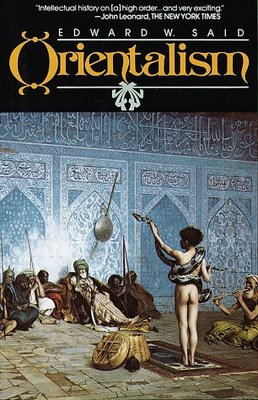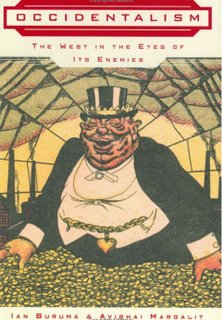6/16/2006
Fear / hate / criticism
 Here's another text I posted on Orkut. There had been many discussions about the meaning of "Islamophobia".
Here's another text I posted on Orkut. There had been many discussions about the meaning of "Islamophobia".
In the other discussions it was said that Islamophobia is often labelled on to people incorrectly, that people are labelled like that who are not afraid of the Islam. It's always easy to label anyone who says something negative about the Islam as Islamophobe and then the discussion is over.
I think that when somebody says something negative about the Islam, there are three possibilities:
1. The person wants to criticize (certain aspects of) the Islam
2. The person is afraid of the Islam
3. The person dislikes or hates the Islam
Only nr. 2 is Islamophobe (and different combinations of the numbers are possible as well). We cannot know for sure what the motives are for why somebody says something. But I think that there are some indications which point to nr. 1,2, and 3.
E.g. nr. 1 will be more neutral and rational in his reactions than the fearer and the hater, who tend to become emotional fast.
And somebody who only criticizes certain aspects of the Islam can have many Muslim friends. If you don't support an aggressive Jihad or stoning women to death, you can be friends with Muslims who don't support that either (and there are many). Someone who hates the Islam can be friends with Muslims as well. The hate can be against something abstract, an ideology, not towards individuals, or not all individual Muslims but just "bad" ones. With fear it is much more difficult. The fear is also abstract, but each individual you meet give an impulse to the feeling of fear. When you are afraid you start to think that every Muslim you meet might be a terrorist.
People who fear and/or hate tend to exaggerate, they blow things out of proportion. While the neutral criticizer can point out exactly what he means without making generalizations and without blowing it up.
Hirsi Ali expects totalitarian Muslims to become the majority / gain power in Europe in 2030 the latest. At this moment 5,7% (highest estimation) of the European population consist of Muslims. Only about 1 percent of the total population has got fundamentalist views (who don't all of them support violence and a totalitarian system). Muslims have to get an incredible amount of children or gain a tremendous amount of converts if they want to reach more than 50%, or at least enough to commit a coupe in Europe as a whole, to make Hirsi Ali's prediction come true.
It's a phenomenon that I have seen a lot in the Netherlands, that natives think that the Netherlands can come under Muslim rule anytime now. That when terrorist summon "normal" Muslims they will obey immediately, all of them, and that she Sharia will be introduced and that natives will live as Dhimmi's.
And then a comparison is made with the people who didn't resist in the Second World war, who pretended that nothing was wrong. We should no longer deny the facts but take action and start a confrontation with Muslims, the great evil and danger had to be stopped immediately. If Muslims don't show that they can be trusted for 200% to support the democracy and to be as civilized as "us", they have to be kicked out of the country immediately.
So this could be a nr. 2 argumentation.
The hater is not so afraid that Europe will become Islamic soon. The hater is not afraid but just angry and he will resist hard if attempts for Islamification would be made. But the hater exaggerates as well. If the Islam is an apple with a rotten spot: extremism (by terrorists and totalitarian regimes), the hater considers the whole apple to be rotten. The Quran is rotten, the Prophet is rotten (psychopath and paedophile) and Muslims are rotten, unless they decide not to follow the Quran and the Prophet (what kind of a Muslim is that).
Individual Muslims can still be normal and friendly but then it's still a pity that they haven't discovered the rotten nature of the Islam yet.
So both the one who is afraid and the one who hates, exaggerate the problem. They see the Islam as an enormous monster that should be killed.Then they start to fight against the Islam as a whole.This while the criticizer and me, we see the Islam as a tasty good apple with a small rotten spot. The criticizer will try to cut the rotten spot out of the apple, he doesn't throw away the whole apple. The criticizer can also be a Muslim himself.Fear and hate lead to generalizations and exaggerations. They lead to the prejudice that Muslims are violent and can not be trusted. It leads to discrimination and racism.And it leads to the conclusion that a common future between Muslims and non-Muslims in a multicultural society is not possible. It leads to "us" vs "them" sentiments. "We" are completely good and "they" are completely evil. They will be excluded from our society, unless they proof that they behave just as good as us, despite them being Muslims.From the other side the protest and violence will increase when they are being excluded and treated like dirt unless they assimilate completely. Their willingness to integrate will decrease then. So fear and hate are bad for the society, while precise and nuanced criticism towards certain practices in name of the Islam can help to counteract these practices.
 And here’s something I wrote later in the discussion:
And here’s something I wrote later in the discussion:The fearers and especially the haters "on the other side" have much in common with the nr. 2 and 3 I described.
Common characteristics:
So the people who overreacted to the Danish cartoons are the West-haters. They see the West as a whole as an enormous monster that should be killed.